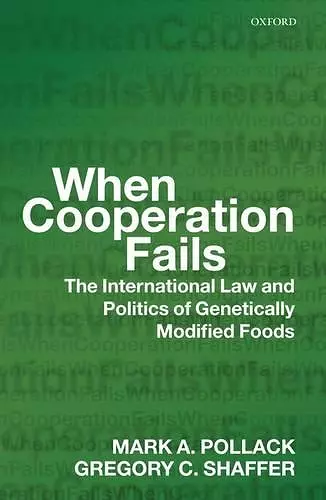When Cooperation Fails
The International Law and Politics of Genetically Modified Foods
Mark A Pollack author Gregory C Shaffer author
Format:Paperback
Publisher:Oxford University Press
Published:21st May '09
Currently unavailable, and unfortunately no date known when it will be back
This paperback is available in another edition too:
- Hardback£102.50(9780199237289)

The transatlantic dispute over genetically modified organisms (GMOs) has brought into conflict the United States and the European Union, two long-time allies and economically interdependent democracies with a long record of successful cooperation. Yet the dispute - pitting a largely acceptant US against an EU deeply suspicious of GMOs - has developed into one of the most bitter and intractable transatlantic and global conflicts, resisting efforts at negotiated resolution and resulting in a bitterly contested legal battle before the World Trade Organization. Professors Pollack and Shaffer investigate the obstacles to reconciling regulatory differences among nations through international cooperation, through the lens of the GMO dispute. The book addresses the dynamic interactions of domestic law and politics, transnational networks, international regimes, and global markets, through a theoretically grounded and empirically comprehensive analysis of the governance of GM foods and crops. They demonstrate that the deeply politicized, entrenched and path-dependent nature of the regulation of GMOs in the US and the EU has fundamentally shaped negotiations and decision-making at the international level, limiting the prospects for deliberation and providing incentives for both sides to engage in hard bargaining and to "shop" for favorable international forums. They then assess the impacts, and the limits, of international pressures on domestic US and European law, politics and business practice, which have remained strikingly resistant to change. International cooperation in areas like GMO regulation, the authors conclude, must overcome multiple obstacles, legal and political, domestic and international. Any effective response to this persistent dispute, they argue, must recognize both the obstacles to successful cooperation, and the options that remain for each side when cooperation fails.
an illuminating and methodologically diverse book...not only a rich interdisciplinary dissection of one of the most intractable trade disputes but also a compelling account of the most spectacular regulatory failure of transatlantic cooperation * Alberto Alemanno, Common Market Law Review *
There is no doubt that this book constitutes a watershed in the literature about the science-politics interface in the international context, and especially in trans-Atlantic cooperation (or lack thereof). The excellent, original, and highly inspiring treatment of this issue, in both theoretical and empirical terms across political and legal disciplines, brings to the fore the deep interdependency in the bilateral, multilateral, and transnational dimensions of the US-EU relations. The five lessons that the authors draw in the concluding chapter open new venues for further research on this matter. But above all, this book is the fruit of a highly successful, tenacious, and systematic research endeavour that provides new insights into this fascinating topic. * Susana Borrás, Science and Public Policy *
The contribution of the work lies in its careful, comprehensive, and ultimately convincing presentation of the arguments...Pollack and Shaffer clearly state that the US and EU regulatory frameworks have been produced in such different ways that they will be resilient to change, even in the face of international pressures, such as WTO rulings. The text contains many facts, a good description, and its scope of research is wide. This book will reward the reader - and cannot be ignored by anyone interested in GMO conflict. * Javier Guillem Carrau ommon Market Law Review *
An engaging and thorough study of a seemingly intractablehe international trade dispute...Pollack and Shaffer evaluate the potential outcomes of WTO panel approaches beyond that actually adopted in the US-EU dispute using severalysis methodologies. Their comparative institutional analysis of offers new and important insights into the consequences of what might superficially seem to be a typical question ofs exegesis and international treaties. The book ably reveals the potentially weighty political and institutionalgal consequences of choosing one seemingly technical legaloice interpretation of a treaty over another, and of the choices of treaties identified as those relevant to the dispute. * Aaron Fellmeth, Global Law Books *
The book shows the limits of diplomacy and international law in areas of deeply entrenched differences of perceptions and attitudes in a regulatory field. It offers many of the elements that need to be taken into account in moving the matter forward in international law in coming years. It is an excellent piece of analytical research and highly recommended to all working in agricultural biotechnology regulation and beyond. * Thomas Cottier, World Trade Review *
When Cooperation Fails is a significant, original contribution regarding the transatlantic dispute over the regulation of genetically modified foods and crops. It is an outstanding and highly informative study of the interaction of four global regulatory regimes and the domestic legal and political responses to them. Pollack and Shaffer provide a model for interdisciplinary collaboration. * Sabino Cassese, Judge, Italian Constitutional Court; Professor, Scuola Normale Superiore of Pisa *
This book presents an original and an exhaustively researched analysis of one of the difficult and intractable disputes in the transatlantic relationship. It skillfully explores the complex interaction between the national and international dimensions of the GMO dispute in a way that clearly illuminates both the potential and limitations of international regulatory cooperation. Shaffer and Pollack have made a major contribution to our understanding of the legal and political dynamics of regulatory-related trade disputes. * David Vogel, University of California, Berkeley *
Mark Pollack and Greg Shaffer's When Cooperation Fails is a masterful analysis of the causes and consequences of the failure of transatlantic cooperation as it relates to agricultural biotechnology In short, while specialists in agricultural biotech and transatlantic relations will find When Cooperation Fails 'must-reading', the book should also be engaged by a wide range of specialists in international law, politics and political economy. * Joseph Jupille, EUSA Review *
ISBN: 9780199567058
Dimensions: 233mm x 154mm x 25mm
Weight: 677g
456 pages